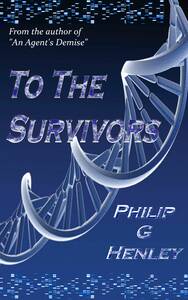First Published at Morphys Book Blog
To The Survivors was published on 13th June on only Kindle for the time being. (Editor: now also available in Paperback and This Author’s View) The story is completely different form my first book, An Agent’s Demise a serial killer/spy/thriller based on the events leading up to and after the second Iraq war. As a new writer, I am experimenting with different genres based on my reading habits. In my teens, I was very keen on Science Fiction, reading many different authors Silverberg, Heinlein, Asimov, Niven and Clarke amongst many others. Their works tended to concern space within science fiction. This is what a news diet of the space race does for the imagination, rather than my later preference for a different type of Sci-Fi such as Neal Stephenson’s books Snow Crash and The Diamond Age. In the 1970’s the BBC, in the UK, broadcast a series called The Survivors; I was gripped by it. The programme was remade and broadcast from 2006 to 2010 but this time I was not gripped, just frustrated by the portrayal and the reality factor.
Both series portrayed life in the UK after a major virus that kills 95% of the population. I have covered my dissatisfaction with this, and other books, films and TV Programmes covering catastrophic events in another blog Dystopian Survival – Where Reality Sneaks In. This blog is about my book, why I wrote what I did, and how I researched the elements that make up the story.
Firstly a disclaimer, as I point out in my disclaimer notice in the book:
‘I have no personal experience of the end of the world as we know it, but neither do you…’
Fiction is just that. It is not real, but if, like me, you like doses of reality mixed in them, then this is the type of plot that I have tried to write. The book is split into four parts. The first deals with the virus and the government’s actions, the next three parts deal with the survivors. What do they have to do to survive. It also covers their thoughts on why they survive. One of the issues I attempt to depict, is how the infected react to their impending doom, heroism, fanaticism or stoic acceptance.
Part One of To The Survivors
For the first part, I focused on the medical aspects of genetic viruses, relying on several research papers available for public viewing including reports on Bird Flu, Foot and Mouth Disease, AIDS and HIV research, but also recent Measles outbreaks and the herd immunity ideas. I also had to research population numbers. SPOILER – My twist to the other genetic virus stories was the impact on mammals. My virus kills them as well, and this also had to be researched in terms of common genes. In other words, my virus plausible if highly unlikely. Recently there has been much discussion about the rise of anti-biotic resistant viruses and diseases such as tuberculosis have made a return. This sparked my reason for a cataclysmic story. Much of my writing is sparked by snippets of news not necessarily the headline. For my first book I used the production of the Iraqi dossiers in the USA and UK which convinced many sceptics that war was necessary against Iraq. Then, when no weapons of mass destruction were found this embarrassing misleading of politicians, media and the public was covered up. For To The Survivors I was intrigued by the spread of measles in Wales during a recent outbreak and the seeming inability of the Authorities to cope. I just went a lot further.
Part Two
For the second part, my focus was on sustainable power and water, mainly solar, along with the basics of survival. I also introduced the key characters for the rest of the book. Several ideas for the house that plays a large part in the story came during the installation and setting up of my own solar power system; although it is nowhere near as extensive as the one described in the book. The viewpoint in this stage switched from the government’s macro view to a survivor’s micro view but covering a similar time period. The house construction had intrigued me since I saw a documentary on the building of a Huf House several years ago. The hardest element wasn’t the house it was deciding where in the UK to locate the scenes. Research using Google maps can only go so far, poetic license has had to be applied to find the right geography, although many locations are accurately described.
Parts Three and Four
The later section of Part Two, and Parts Three and Four are the story from a survivor’s perspective. The Sci-Fi reduces as it turns to more human interaction elements. This takes the timeline into the future and the different challenges that evolve. This is more fiction, than science. The Sci-Fi element remains in the settings, but there is no new technology, super power abilities, or other elements typical of this genre. New technology is ruled out due to the collapse of civilisation. No one has super power abilities, unless surviving the virus is considered to be an evolutionary step by human kind.
Civilisation
In the book, are several quotes on the fall of civilisation. I found these or had read them previously. I am interested in post-Roman Britain as an example of the fall of civilisation. How did so much technology and capability disappear? Roman houses had central heating, but nearly two thousand years later many houses in the UK still do not, or were built without it. In all the sections, I wanted to cover the realities of living in this new world. That has meant talking about sewage and latrines. I am not that interested in toilets, but it’s something that I felt was missing from virtually every other book and film in the genre. My previous experience in the military helped here, not with the descriptions but the reality of survival. I found on deployments that living without a modern toilet or shower is not fun. Yes, camping for a few days with a chemical toilet might be an adventure but we all feel relieved when we return home to hot running water and flushing loos. Modern humanity creates massive amounts of waste for disposal from food packaging to empty bottles. Even a scavenging society has to dispose of its waste. The sewers and drains no longer work so how do people cope? This element seems to be conveniently overlooked in nearly every film, TV, or book portrayal. The blockbuster movies love using CGI to destroy a city, when creeping grass over a road is more realistic and will eventually prevent road travel.
The Survivors’ Characteristics
Character development is always tricky, I prefer not to give too vivid physical descriptions of people, not because I am not picturing them in my mind, but I want the reader to paint their own picture. Where it is relevant I have described race and age, along with the gender, but I deliberately kept this minimal. I have also tried to write only from what the chief protagonist knows, might know, or has been told by another character. Consequently, he does not know everything or why certain things in the plot have happened. I have given him some character traits, which go some way to providing an insight to his actions, but again I leave some of this open to interpretation. Mostly, I wanted to write about what people did, more than why other than the overreaching to survive.
Many friends and family have asked if I have used them as the basis for my characters. This has a yes, and no answer. In that some elements are bound to filter through, but it is more likely to be a snippet rather than an entire character. When I picture a character in my mind, I may base this on someone I have met, but it is unlikely to be a friend or family member because that will condition my thoughts rather too much.
Survivor’s Actions
Some survivors are more ruthless than others, which lead to other concerns about censorship and how far descriptions go. I have blogged on this dilemma for an author before in How Far Should I Go. It remains a cause of concern and the more extreme I am, the less audience I might have in for example Young Adult readers. My books are not for children, but I read so called adult literature as a teenager, so the YA market is confusing for me anyway. Would I want my children to read what I have written? They are both adults, so it does not apply now; in fact most of the moral comments have come from friends who seem surprised that I can write about sex and violence. Morality, in my view, is easy when you are living in semi-luxury, with a full belly and enough water to drink.
History teaches us that rape and other violence is common in stressful situations from war to famine. Disaster survivors, whether genocide or natural calamities, report different experiences, from Death Camp guards, to Schindler’s List, and onwards to cannibalism in the case of the Andes air crash survivors. If personal behaviour is based on background and culture, what happens when that envelope disappears? I am not a woman, but if I were, would I sell my body for food, shelter, or water? As a man would I take advantage of such a woman and is that rape? In our comfortable homes we all like to think we would behave with decency and morality, but would we? Society no longer exists so its morals, may not survive either. In my story, new moralities and behaviours takeover especially in the relationships between the survivors and the need to procreate.
In the end, I have written a fictional story. I hope thousands read it and enjoy it, but some will not, some will loathe it, some will criticise it, some will complain that it would have worked better with aliens, or zombies, or a nuclear war. If it makes a reader turn into a writer because of their dissatisfaction with my efforts then all the better. I am happy to move on to my next book and story, another change of genre, but that is for another day.



